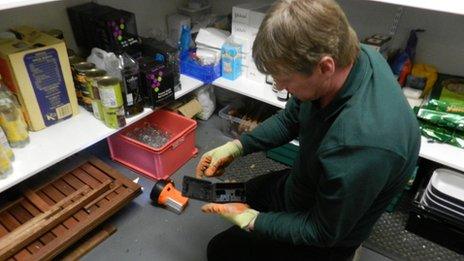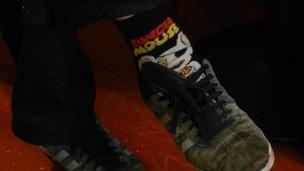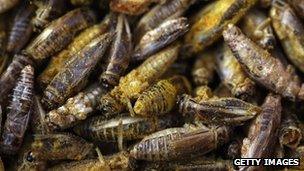Why pest control businesses are making a killing
- Published

Pest control experts like Graeme Hill have found themselves in a booming industry
You can't tell what Graeme Hill does for a living just by looking at his Danger Mouse socks, but they might give you a clue.
Is he a fan of the animated superhero? Perhaps, but his day job revolves much more around real-life rodents. Graeme is one half of Scottish husband-and-wife pest-fighting duo Wee Critters, and there is nothing else he would rather do.
Graeme is not the only one - the worldwide pest control industry is going from strength to strength.
According to market research company IbisWorld, the sector in the UK alone is worth more than £367m and growing. In the US it's worth more than $11bn (£7bn).
Graeme and his wife Sylvia earned their first contract as Wee Critters in 2009, after Graeme had spent 10 years working as a pest control technician with another firm based in Edinburgh.
"I knew there was a gap in the market for a more personalised service," he says. "I genuinely care about the people I'm working for - I do as much as is humanly possible to rid them of their problem."
Unusual habits
Sylvia, who has a degree in psychology, came up with the company name to reflect their caring approach. "The name works very well for us and creates the right impression," she says.
"Lots of our customers of all age groups comment on it and tell us that when they saw our name they knew we were the right company for the job.
"Often people remark on the fact that the name takes away the 'nasty' side of pest control, and makes them feel better about the situation. This is exactly what we want to achieve."
Graeme and Sylvia say that Wee Critters is growing at a rate of about 40% a year.
The UK pest control industry as a whole is growing by about 6% a year.
That's largely because there are simply more pests around. Some are displaying unusual migration habits, due to both manmade and natural factors, such as exceptionally hot or cold weather.
And some insects and flying creatures are multiplying at faster rates, according to Rentokil, one of the UK's leading pest control companies.
On average, it says, bedbugs lay 350 eggs a year, in batches of 10-50.
Wasp activity
Houseflies deposit eggs in batches of 75-150, and may deposit as many as 20 fertilised batches from a single mating; breeding rates for houseflies are dependent on environment.
Rodents produce litters of anything from four to 16, born three weeks after conception.
The key thing for rodents is that if they have found food and shelter, the females can suckle one litter while gestating the next.

It is the mice who are in danger when Graeme Hill is around
Growth in Asia helped Rentokil increase its pest control revenue by 16.5%, external in the first six months of this year.
According to David Cross, Rentokil's UK technical manager, the types of pests faced tend to vary from year to year.
There has been a recent global rise in callouts relating to bedbugs, he says, which is reflected in the UK. On a local level, warmer weather has led to longer breeding seasons and larger populations of insects or rodents.
"In the UK, 2013 has seen some interesting rises in different pest activity," Mr Cross says.
"The oak processionary moth was heavily reported through the media during early summer, we saw a significant increase in wasp activity compared to the previous year, and more recently there has been an increase in requests for the control of false widow spiders, particularly around the south coast of England."
According to IbisWorld analyst Temitope Onabanjo, wet weather this year has "spurred a rise in the number of rodents such as rats and mice coming indoors", while the change to fortnightly bin collection is cited as the main reason for an increase in small insects such as ants and maggots.
Greater use of second-hand furniture, driven by the economic downturn, is also leading to greater pest problems - an infestation in one home can be transferred in the furniture to another home.
Innovative killing
At the same time, the British Pest Control Association (BPCA) warns that many local authorities are cutting or discontinuing their pest control activities.
It says 35% of councils do not currently have an in-house service, and of those that do only 7% still offer free treatments, according to the BPCA's 2013 National Survey, external.
The result is that the market for private pest control films is expanding.

Infestations depend on weather conditions and migration habits
The nature of the business is changing too. Conventional tools such as poisons are gradually giving way to new, innovative ways to kill pests.
Mark Sheahan, the inventor-in-residence at the British Library's Business & IP Centre, has spent recent years working on his patented Putdown rat trap, which uses no poisons or powders, and resets itself so it can kill continuously. He does not wish to give too much away, but says that it uses a natural abundant resource to kill the rats, which is harmless in any other form outside of the trap.
"What I say is that if you call a pest controller now, you are probably looking at £80 callout, and maybe they have to come back two or three times to put poison down. That is going to cost £200-300," he says.
"My system, I believe, can be made for around £5 or £6 all in, and I'd sell it for £25. And I think people would pay that. It kills more than one rat a night, and is reasonably humane."